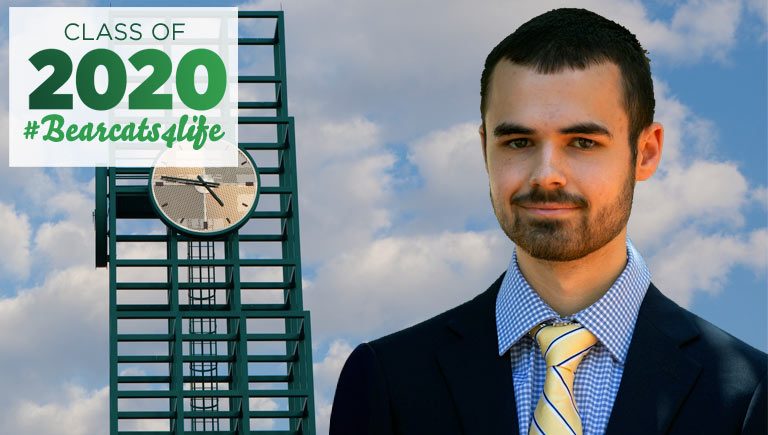Commencement 2020 profile: David Titus
Economics major forecasts a future in research

Sometimes the simplest equation can lead the mind deeper, exploring realities beyond the initial progression of numbers and logic.
David Titus originally imagined himself as an accountant or actuary, based on his dual majors in economics and mathematical sciences. Binghamton University was also a logical part of the equation; his parents are both alumni, and it proved affordable, high-quality and close to his home in Webster, a Rochester suburb.
Now that graduation has arrived, he finds himself on a new trajectory: headed to Cornell for his PhD, and ultimately a career as a researcher and professor, inspiring a new generation of economists with a love for a fascinating field.
“In hindsight, it was one of my best decisions. I am unsure if I would have had the same opportunity to study and research economics elsewhere,” he said of his choice to attend Binghamton.
The University brought him opportunities to expand his horizons in unexpected directions. Through the Scholars program, he ended up taking classes on subjects he wouldn’t have considered on his own. In one class, for example, he focused on the moral and political issues surrounding wolves.
Each of his economics professors left a unique and positive impact, Titus said. Assistant Professor David Slichter gave him needed advice about research and future career opportunities in economics, while Distinguished Professor Solomon Polachek’s use of applied research in his labor economics class prompted Titus’ interest in that field. Assistant Professor Plamen Nikolov’s encouragement, mentoring and support throughout the graduate application process also critically influenced Titus to take the next step toward his future.
His college experience also offered opportunities that changed his life. Titus worked as a teaching assistant for Slichter and as a tutor for the Educational Opportunity Program, experiences that inspired a newfound love of teaching. He spent last summer in Washington, D.C., analyzing tax and budget policy for a think tank.
After Polachek’s labor economics class and a research assistantship through Nikolov, Titus knew he wanted to make an impact as a researcher and professor himself.
“I realized that I loved to research just as much as I loved to teach. That was the deciding factor for me,” he said.
As a research assistant in Nikolov’s economics research lab, Titus learned how to use statistical software, design theoretical models and coordinate effectively with a team. For the past year and a half, he has contributed to ongoing research regarding immigrants’ impact on domestic labor markets, and modeled the impact of improved HIV therapy on the behavior of HIV-positive individuals.
“Both of these projects relate to vital policy issues, and I could not be more grateful to participate in them,” he said.
At Cornell, he plans to focus on applied microeconomics research, mostly in labor, education and health, although he remains open to other possibilities.
Nikolov expects Titus will be one of the top applied theory candidates of his cohort at Cornell, pointing to his extensive research experience and his classroom performance. On the research team, Titus’ programming skills were pivotal in a study of immigration after the Syrian civil war and its impact on native workers in the European Union, Nikolov said. Titus also excelled in some of the most challenging economics and mathematics courses available, such as topology and number systems, as well as courses more typically required of PhD economics students.
“David is really an impressive young scholar; he has the intelligence to identify interesting economic questions, the technical skills to answer them well and the perfect balance of ambition and humility to get the work done,” Nikolov said. “He is tenacious and passionate about economics and understanding the world better.”

